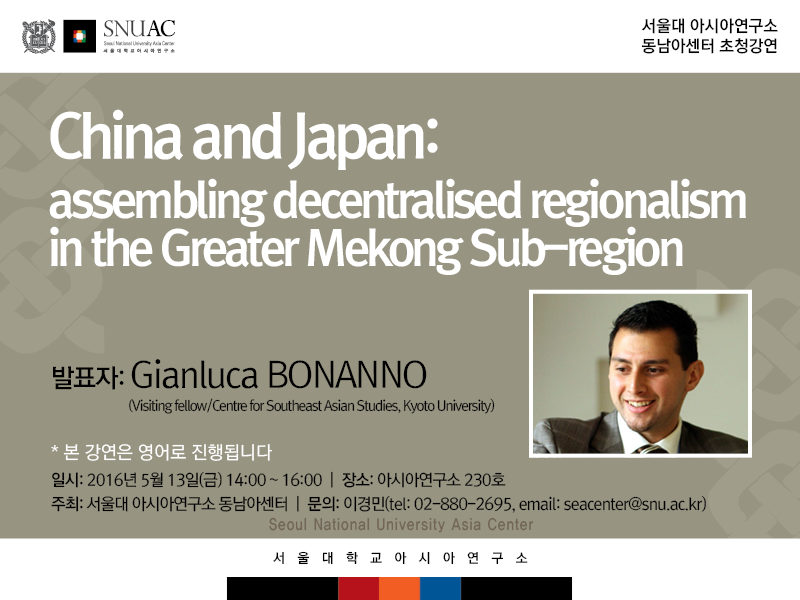
China and Japan: assembling decentralised regionalism in the Greater Mekong Sub-region
SNUAC Special Lecture
Title: China and Japan: assembling decentralised regionalism in the Greater Mekong Sub-region
- Time: Friday, 13 May 2016, 2:00 pm – 4:00 pm
- Language: Lecture will be given in English
- Venue: Seoul National University Asia Center Rm.#230
- Presenter: Gianluca BONANNO/Visiting fellow/Centre for Southeast Asian Studies, Kyoto University
- Host: SNUAC Southeast Asia Center
- Contact: 02-880-2695 (seacenter@snu.ac.kr)
Abstract: This talk, after providing an analysis of the current stage of regionalisation in the GMS, will focus on a Southeast Asian development paradigm that challenges Western models and defies the laws of international relations’ theories when detached from trans-disciplinary area studies. In particular, regionalisation in Southeast Asia will be analysed though the lenses of Chinese and Japanese participation: motives behind their involvement, the rules of engagement, the separation of operating grounds, the balance of power, and conflicts of interest. Finally, a brief but insightful analysis of domestic, regional and global implications of such participation will be discussed.
Presenter Bio:
 Gianluca BONANNO (Dr., International Relations, Ritsumeikan University, Japan) is founding member and Vice-President of the International Peace and Sustainability Organization (IPSO); he also serves as Director of IPSO’s think-tank. He periodically holds Visiting positions at the Centre for Southeast Asian Studies, Kyoto University; he is a research associate at the Mekong River Commission Secretariat; and a visiting research associate at the Asian Development Bank. He is a member of many academic associations dealing with Southeast Asia. He is a consultant at the International Criminal Police Organisation and the European Police Office for trans-national crime. He serves as an international advisory board member for the Greater Mekong Sub-region Academic and Research Network. His main research interest is in trans-boundary issues in the Greater Mekong Sub-region (mainland Southeast Asia) and beyond, particularly the multi-faceted socio-economic development of border zones and its broader micro and macro geopolitical implications. A Rotary International Fellow and development consultant, he also works practically on the ground as leader of sustainable development projects and he is an advocate of the theory-practice divide.
Gianluca BONANNO (Dr., International Relations, Ritsumeikan University, Japan) is founding member and Vice-President of the International Peace and Sustainability Organization (IPSO); he also serves as Director of IPSO’s think-tank. He periodically holds Visiting positions at the Centre for Southeast Asian Studies, Kyoto University; he is a research associate at the Mekong River Commission Secretariat; and a visiting research associate at the Asian Development Bank. He is a member of many academic associations dealing with Southeast Asia. He is a consultant at the International Criminal Police Organisation and the European Police Office for trans-national crime. He serves as an international advisory board member for the Greater Mekong Sub-region Academic and Research Network. His main research interest is in trans-boundary issues in the Greater Mekong Sub-region (mainland Southeast Asia) and beyond, particularly the multi-faceted socio-economic development of border zones and its broader micro and macro geopolitical implications. A Rotary International Fellow and development consultant, he also works practically on the ground as leader of sustainable development projects and he is an advocate of the theory-practice divide.
